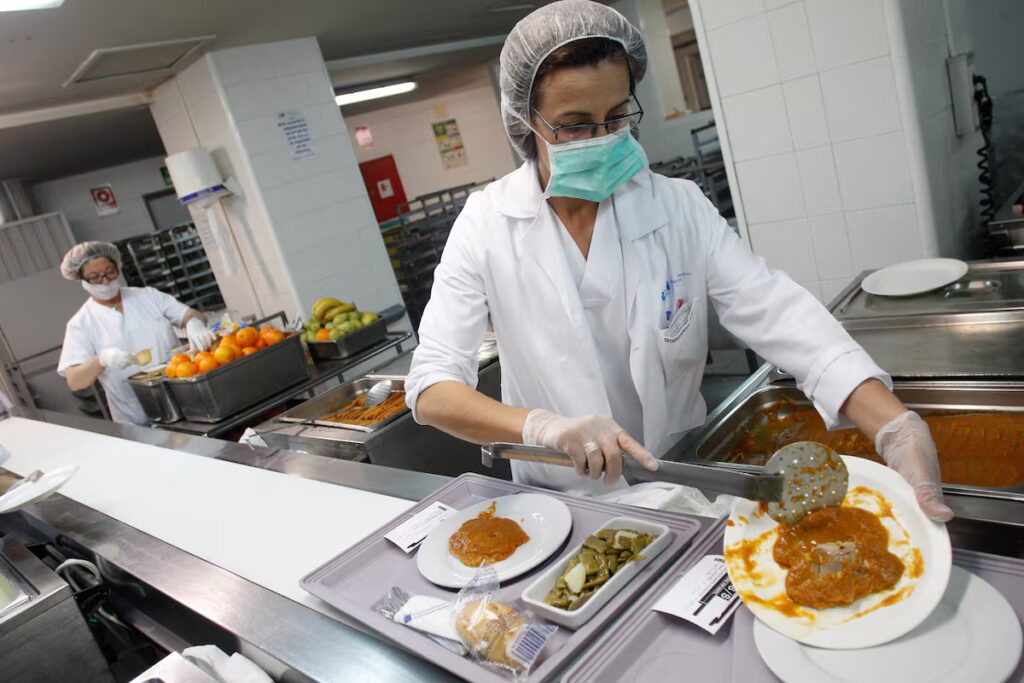
The Ministry of Consumer Affairs announced on Wednesday that it will eliminate ultra-processed foods from the menus offered to children and adolescents admitted to hospitals. “That there is no type of control over these foods, with such extensive evidence of their effects, is incomprehensible,” said Pablo Bustinduy, Minister of Social Rights, Consumption and Agenda 2030. The announcement was made during the presentation of the Acceleration plan to stop obesityorganized by the Ministry of Health and the World Health Organization (WHO) this Wednesday. This veto on ultra-processed foods will be included in a royal decree that aims to ensure healthy nutrition in hospitals and care homes. The Ministry reminds, however, that the autonomy of the patient who wishes to consume these products will be maintained.
The text that Consumi is working on will also limit ultra-processed foods included in children’s menus in the canteens and dining rooms open to the public in these centres. Therefore, the legislation will follow in the footsteps of the Royal Decree on healthy and sustainable school canteens, approved by the government in April 2025, which required that meals in schools and institutes comply with the health recommendations of scientific organizations such as the WHO or the State Agency for Food Safety and Nutrition (AESAN).
Ultra-processed foods have colonized our refrigerators for the last 20 years. They thus went from 11% of the diet to 32%, according to a series of scientific studies published in the scientific journal The Lancet on November 19th. The text also highlights how this food paradigm, “driven by the desire for corporate profit, not nutrition or sustainability,” erodes global health and calls on governments to act.
The measure announced by Bustinduy (Sumar) goes in this direction, as it establishes minimum criteria of nutritional quality and sustainability that guide the contracting, acquisition and supply of food and drinks offered in hospitals and nursing homes. From Consumo they specified that the ultra-processed foods that will be limited will be “those products with a complex industrial formulation, with processed ingredients, additives and nutritional profiles with a high content of saturated fats, sugars or salt”, as in the case of sugary drinks, some snacks or industrial pastries and biscuits.
“This regulation responds to a social protest, and also from the scientific community, as well as to the numerous complaints made both by citizens and by social entities and professional groups,” said Minister Bustinduy.
Furthermore, he stressed that the public sector must lead the transition to healthy food environments and that his ministry will be “a pioneer when it comes to action in this area”, as the WHO claims. “Growing food consumption represents a systematic threat to public health, equity and environmental sustainability,” he added, “public authorities have a responsibility to create environments in which making healthy decisions is simple and accessible.”
International organizations such as the aforementioned WHO or Unicef have launched an urgent appeal to governments to stop the increase in ultra-processed foods. They point out that the colonization of the diet by these products represents “a systemic threat to the health, equity and well-being of children”.
Research published by The Lancet The study associates its habitual intake with a higher risk of obesity, type 2 diabetes, cardiovascular disease and premature mortality and also highlights the accelerated shift of healthy eating patterns, including the Mediterranean diet, towards patterns dominated by highly processed products. Several Mediterranean countries – such as Italy, Greece or Portugal – have managed to keep the percentage of consumption of ultra-processed foods below 25%. This is not the case in Spain, where it exceeds 30%.
Both WHO and UNICEF have called for “ambitious policies and tougher regulations” to create healthy food environments. Hospitals and health centers, as well as schools and educational centers, appear as priority areas for the implementation of the measures.
“The available scientific evidence is sufficient and justifies the adoption of urgent and decisive actions to stop the consumption of these products and improve the health of the population,” explained Maira Bes Rastrollo, professor of Preventive Medicine and Public Health at the University of Navarra and co-author of the study. The Lancet in an article on EL PAÍS.
This meta-analysis, which compared data from more than 36 countries by reviewing 104 studies published between 2016 and 2024, “shows that some of the major chronic diseases affecting modern life are associated with increased consumption of ultra-processed foods,” said Jules Griffin, director of the Rowett Institute at the University of Aberdeen, in statements to the SMC science portal.
Comparisons with the tobacco industry are constant in the report, referring to when, in the middle of the last century, companies tried to silence the scientific evidence against them based on marketing and lobbying pressure. Now the same thing would be happening, explain the scientists, who point directly to a handful of manufacturers that dominate the market, companies such as Nestlé, PepsiCo, Danone, Ferrero, Kraft Heinz and Coca-Cola.





